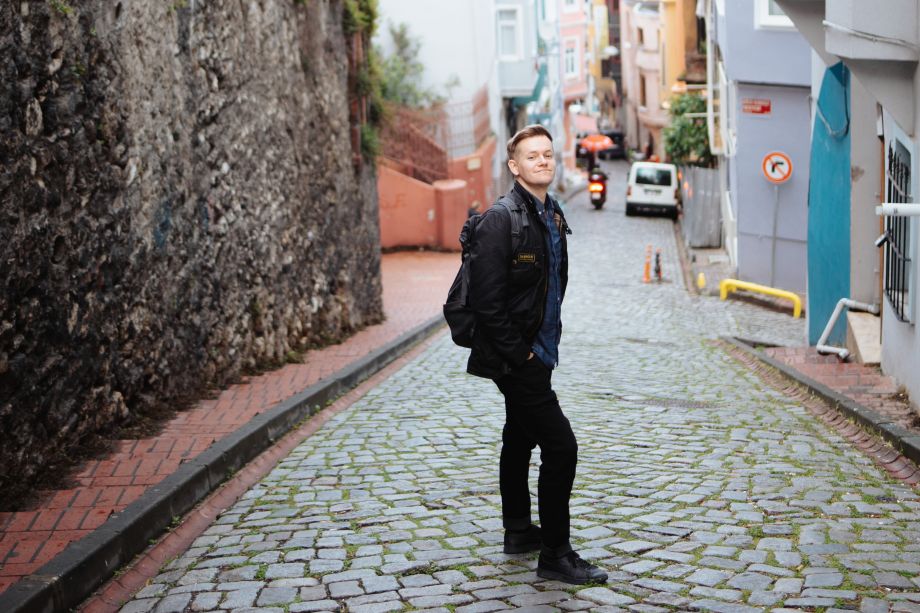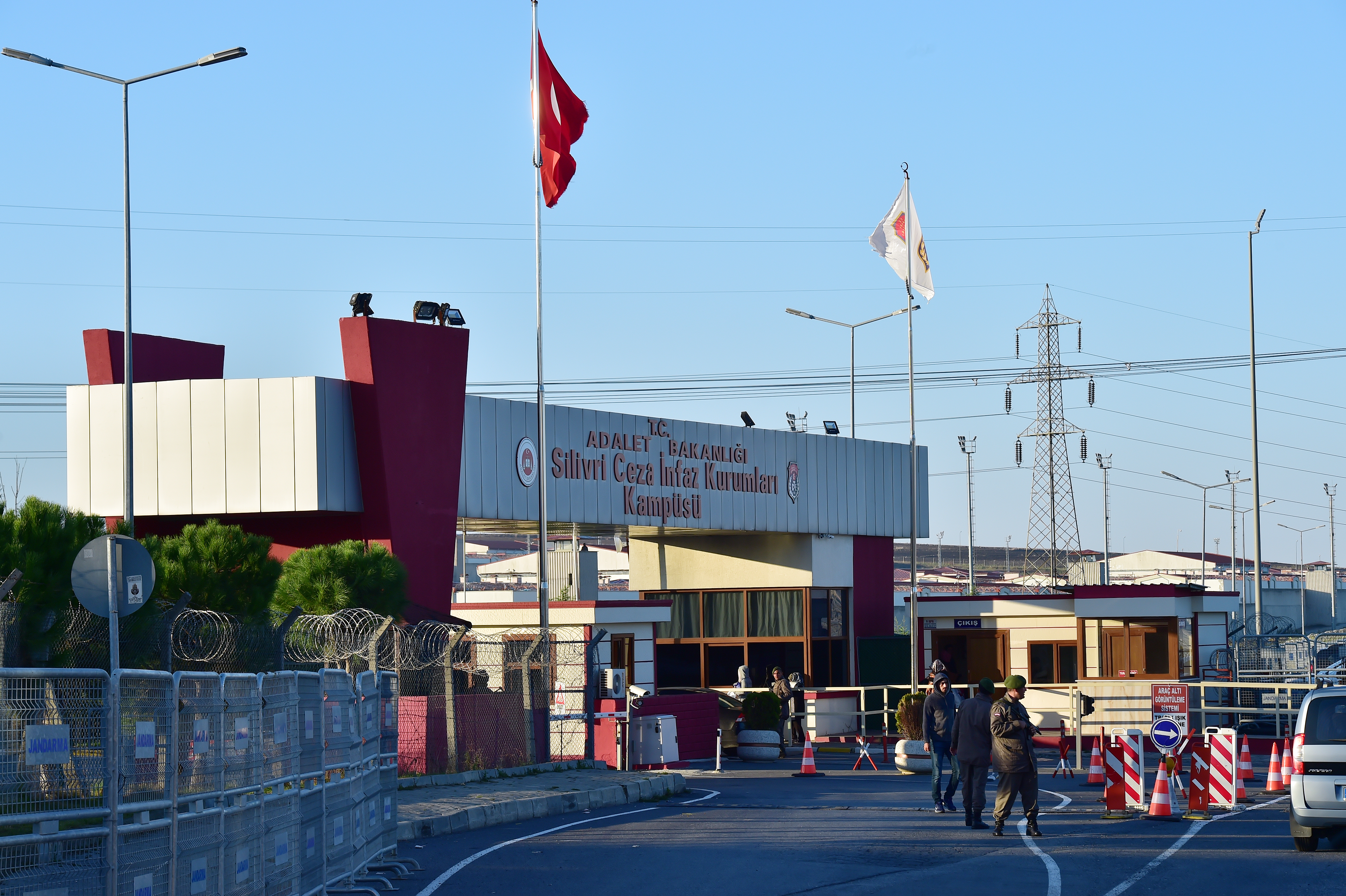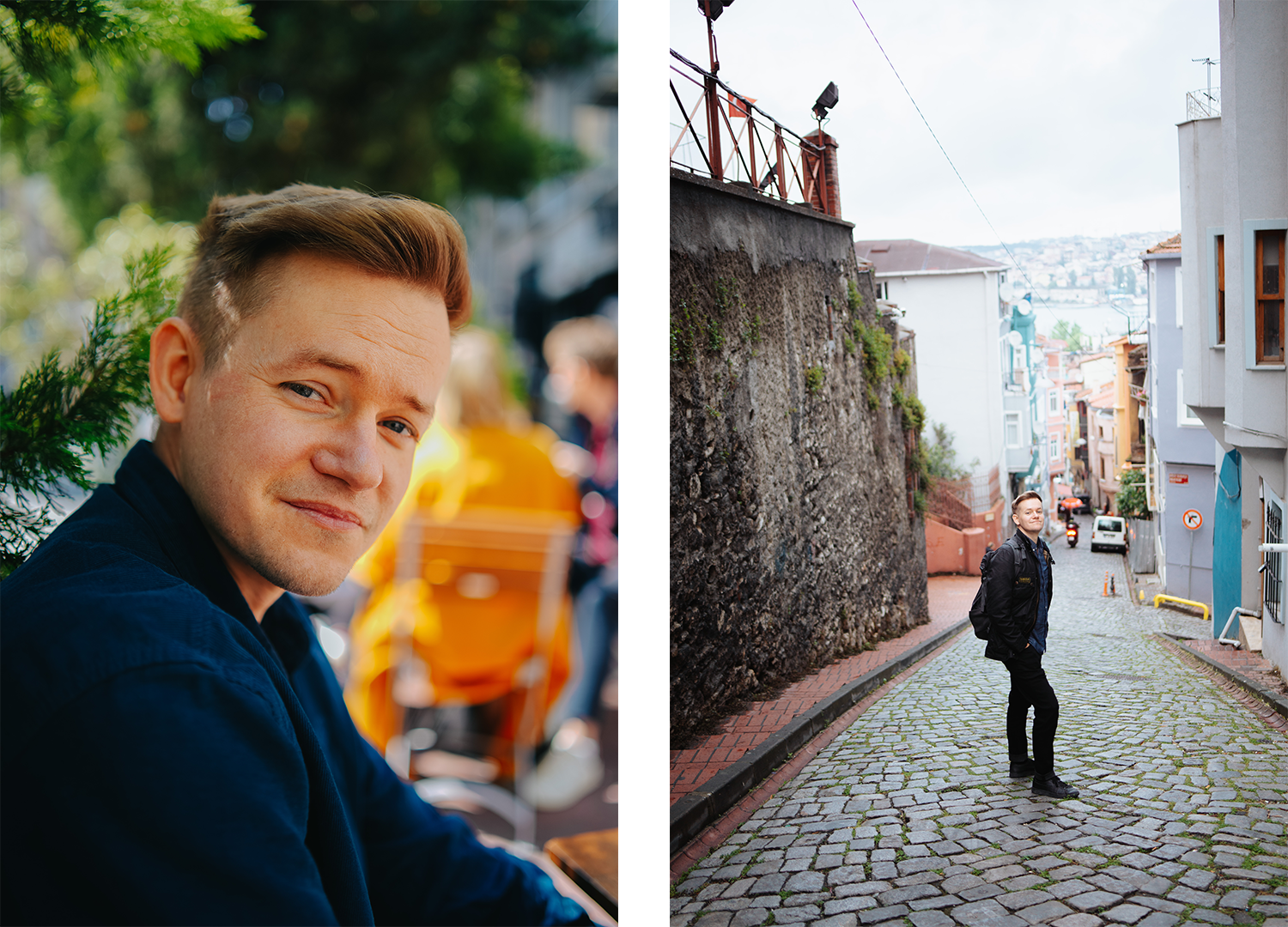
Seven weeks in Turkey’s Marmara prison
On 27 March 2025, Swedish author and journalist Joakim Medin is detained at Istanbul airport, where he had travelled to report on the nationwide protests following the arrest of Istanbul Mayor and opposition politician Ekrem Imamoglu.
Joakim Medin is placed in the same ward of Marmara prison as Imamoglu himself, and he is charged with insulting the president, membership of a terrorist organisation and making terrorist propaganda. He spends 51 days in prison and is given a suspended sentence for insulting the president before being deported to Sweden and banned from returning to the country. His next trial is scheduled for 25 September.
In PEN/Opp, Joakim Medin talks about his time in prison and how he copes with everyday life as a prisoner through daily routines and small acts of resistance. He never stops being a journalist, even when the regime calls him a terrorist.
In April of this year, a friend back home in Sweden sent me a message while I was incarcerated in the Marmara Prison. It was a quote from an interview in a French press publication with the author and journalist Ahmet Altan, who is an honorary member of several PEN centers. Ahmet Atlan was himself locked up in the Marmara Prison for four and a half years after having been swept up in a wave of mass arrests together with several other writers following the attempted military coup in Turkey in 2016. President Recep Tayyip Erdogan saw an opportunity to get rid of his critics.
Ahmet Atlan was accused of being involved in the attempted coup and also for “supporting a terrorist organization”. He was convicted and sentenced to life imprisonment which was later reduced to ten and a half years behind bars. In 2021 he was released following a ruling by the European Court of Human Rights, which found that the allegations lacked any foundation.
In the quote Ahmet Altan speaks of risks.
“Turkey is full of risks. It’s like a minefield – you never know where you’re stepping. I cannot live my life surrounded by fear. But if you choose silence out of fear, you have created a prison for yourself, and no one can save you from it.”
For a long time, I’ve had a knot in my stomach every time I’ve returned to Turkey. A worry that one of these days I’ll be stopped in the passport control. I will be told that my presence in the country is unwelcome, that I will be deported and banned from returning for several years. I know that other foreign journalists have felt the same anxiety.
However, I have never allowed this risk to deter me from travelling to Turkey, to report on the people and the political situation as it plays out on the ground. Only when you are in the place itself can you capture all the nuances in a society. Nor have I ever refrained from reporting on something in Turkey out of fear of reprisals, as this would have merely led to constructing a cage of self-censorship that Ahmet Altan warned against.
However, I could never have imagined that I would be facing the kinds of accusations that is now levelled against me. Especially since I am a foreign journalist and a Swedish citizen without ties to Turkey.
However, I could never have imagined that I would be facing the kinds of accusations that is now levelled against me. Especially since I am a foreign journalist and a Swedish citizen without ties to Turkey.
The arrest itself took place on March 27 2025 at Istanbul Airport, in exactly the kind of circumstances that I had previously imagined. But rather than being put on the next flight back to Sweden, I was taken to a police station where I was made to spend the night.
The next day I was taken to a court room. On a small screen in the corner of the room, I could see a prosecutor through a moving image, participating remotely on link from Ankara. The prosecutor was holding a thick, white folder with preliminary investigation materials: open-source information; screenshots from posts I’d made on Facebook and X where I’d shared links to my own articles and job-related images.
These materials mainly concerned my reporting from Syria 2014–2015, published in articles and in a book containing reportage pieces about the Kurdish resistance forces who, while supported by the west, were waging war on the jihadist group known as the Islamic State. In addition, there were articles from 2023 that concerned the Swedish Nato accession process and the influence campaign carried out by Turkey against Sweden during this period. The prosecutor was particularly irritated by the fact that the news publication where I am employed, Dagens ETC, illustrated some of these articles with images showing an effigy made the likeness of Erdogan that Swedish activists had strung up outside the City Hall in Stockholm in January 2023. The prosecutor considered these activists to be members of the Kurdish PKK movement which is designated as a terrorist organization in Turkey.

Unbeknownst to me, my journalism had led to me being declared a wanted person in Turkey.
– You stand accused of having insulted the Turkish President, Recep Tayyip Erdogan, and stand accused of having been involved in terrorist acts in front of the City Hall in Stockholm. You stand accused of being a member of an armed terrorist organization. Finally, you stand accused of spreading terrorist propaganda, the prosecutor states.
For half an hour I was interrogated about how I viewed these charges. The prosecutor leafed through his folder and asked me to comment on the articles and images. I had to repeatedly point out that I couldn’t see what he was holding up on the little screen. A few times a technician zoomed in closer to the folder, at other times he did not.
I was in shock, with an aching knot of anxiety in my stomach. The situation was surreal. But I was also aware of how it connected to with increasing authoritarian tendencies in present-day Turkey.
Similar accusations have been levelled at a great many Turkish and Kurdish journalists before they were ever aimed at me. This has happened to thousands of well-known writers, academics and politicians belonging to the opposition, and tens of thousands other people in Turkey just for having dared to criticize those in power. Charges of insulting the presidency and crimes related to terrorism are some of the most common tools employed by the Erdogan regime in its attempt to threaten, incarcerate and silence critics among civil society. Anyone can be claimed to be connected to PKK or other groups designated as terrorist organizations in Turkey.
I am aware of this because I’ve reported on it in many articles, reportage pieces and several books for more than ten years. And now, the same thing has happened to me.
I am aware of this because I’ve reported on it in many articles, reportage pieces and several books for more than ten years. And now, the same thing has happened to me.
Between the end of March and May this year, I was incarcerated in the high-security Marmara prison west of Istanbul. It is Europe’s largest prison and notorious for containing many of Turkey’s political prisoners. I was placed in Ward 9, which is intended for precisely that type of prisoner.
The cell where I was locked up measured approximately 18 square meters. I remained there, in complete social isolation, for 46 of a total of 51 days in Turkish custody. I was only allowed to leave the cell on a few occasions, such as when I was visited once a week by my lawyers and the Sweden Consul General in Istanbul.
I missed my family, friends, and colleagues. Most of all, I missed my wife Sofie, who was pregnant at the time, expecting to give birth within a few months to our daughter Esme. I was incredibly worried that I wouldn’t make it home in time.
During the ensuing weeks, which would turn into almost two months spent in the Marmara prison while waiting for my trials to begin, I established a consistent daily routine and exercised small acts of resistance. It was a way to fill the days with meaningful moments in order to avoid getting stuck in depression.
From morning until half past seven in the evening, I had access to my own exercise yard, which was the same size as my cell. This made my prison world feel much more spacious. I walked around and around the yard for at least half an hour every morning and afternoon. Every other afternoon, I would carry filled water jugs in my hands, that I would lift and use as a substitute for dumbbells. Inside the cell, I would continue with sit-ups, push-ups, squats, and other exercises for an hour.
The prison administration did not allow us prisoners to have flowers or potted plants, but they couldn’t really say anything about herbs that were distributed with dinner. I defied the rules by treating the parsley as if they were the most beautiful orchids.
I lovingly nurtured and tended bunches of parsley that stood in cut-off plastic bottles in my window. I made sure they had water, removed any wilted stems, and wiped off any bird droppings. The prison administration did not allow us prisoners to have flowers or potted plants, but they couldn’t really say anything about herbs that were distributed with dinner. I defied the rules by treating the parsley as if they were the most beautiful orchids.
Another act of resistance that I committed to as part of my routine was that I never stopped being a journalist, even when the regime called me a terrorist. Already the first day I began memorizing snippets of dialogue, the look and feel of the various environments and the names of people around me. After a few days in Marmara, when a fellow prisoner threw me a pen from his exercise yard over the wall into mine, I began to keep a diary about my situation and the charges against me. In coded notes, I summarized conversations I’d had with other prisoners in the nearby isolation cells.
It was my neighbors who saved me during this first mentally challenging period. I communicated with them on a daily basis by shouting through the thin gap between my cell door and the floor. We talked about our backgrounds, families, physical training, politics, history, and philosophy. Above all, they gave me support.
– Joakim, you must be a good person. And you must have done everything right. No one sitting here as a political prisoner is guilty of having done anything wrong,” says Mustafa, who is in a cell two doors away.
In addition to my immediate neighbors, I established contact with a few other people. I spoke briefly with a prisoner in a corridor, a man in his 40s who told me he was a Youtuber. He too was accused of insulting Erdogan. In that same corridor, I greeted the famous democracy activist Osman Kavala. He is sentenced to life imprisonment, accused of organizing protests critical of the regime in 2013 and thereby attempting to “overthrow the constitutional order.” The European Court of Human Rights has demanded his release. Kavala sends several books to my cell.
I also had the opportunity to say hello to the mayor of Istanbul, Ekrem Imamoglu. On several occasions, I ended up sitting close to him when I had meetings with my lawyers in the prison’s transparent visiting booth. My lawyers acted as messengers, relaying polite phrases between us.
Imamoglu is Erdogan’s main political rival and the official presidential candidate for Turkey’s largest opposition party, the CHP. In early March of 2025, he was arrested and locked up in the political prisoners’ wing of Marmara Prison, accused of “corruption and terrorist crimes.” The political elimination of Imamoglu was the original reason I had traveled to Turkey in order write my reportage.
These were heartwarming little encounters with people who were in the same vulnerable position as I was. Such encounters also provided fascinating insights into the gigantic political prison system that has emerged under Erdogan’s rule. Here you find people from most opposition circles that have been continuously attacked ever since the president led his country down an authoritarian path in 2013.

My greatest fear during these weeks was that I would not receive a fair trial, and that it would take a long time before I would even be allowed to appear before a judge. But a preliminary hearing was already scheduled for April 30, during which I was given a suspended sentence of 11 months and 20 days for the crime of insulting Erdogan due to my articles being illustrated with pictures of the Erdogan doll in Stockholm.
Then, on May 16, I was suddenly deported from Turkey. I landed in Stockholm at midnight and reunited with my wife, who now was heavily pregnant. My editor-in-chief Andreas Gustavsson and Sweden’s Minister for Foreign Affairs, Maria Malmer Stenergard, were also waiting for me at the airport. Everyone gave me hugs.
People say that a combination of factors led to my being sent home. Pressure from Swedish and international media and press freedom organizations. Pressure from the Swedish Ministry of Foreign Affairs. A resolution demanding my release, adopted by an almost unanimous European Parliament. And possibly also the ongoing peace process between Erdogan and the Kurdish movement, which would lead to the release of other political prisoners as well.
But I would be lying if I claimed not to be afraid that there might’ve been things said or done or promises made behind closed doors while the Swedish and Turkish representatives were meeting.
Freedom of movement is never as sweet as when one has been deprived of it and then succeeds in regaining it.
Freedom of movement is never as sweet as when one has been deprived of it and then succeeds in regaining it. I am incredibly happy to be back home again. But my future remains very uncertain. I have been banned from ever reentering Turkey. The legal process is still ongoing albeit remotely, and on September 25 my second trial will begin, one in which the charges of membership in a terrorist organization and the spreading of terror propaganda will be determined.
The indictments have been sent to me during the second week of September. I stand accused of having reported on the western allied Kurdish forces in Syria in such a way that portrays them as “legitimate actors”. Turkey regards them instead as terrorists and as a part of PKK which is a banned organization. I am also guilty of having described the Turkish drone bombing operations that have targeted Kurdish military installations and civilian infrastructure in Syria as “attacks”, while according to the prosecutor these acts are instances of Turkish “self-defense”.
This is why it is claimed that I have spread propaganda that has benefited terrorists, and why I am also considered a terrorist. I am confused about the fact that my profession is being targeted in this way, while there are thousands of other journalists who have also visited northeastern Syria and reported on the Kurdish successes in the war against the Islamic State. Turkish media has also done this kind of reporting.
But I have seen in the indictment documents that the preliminary investigation against me was launched in February of 2023. It was during this period that I was most active in my reporting on the various demands mounted by Turkey against Sweden during the Swedish Nato accession process. Perhaps that is what put me on the Turkish authorities’ radar.
It is more likely that they want to use the charges against me as a deterrent – to make other journalists nervous.
Turkey does not necessarily want me to serve out my sentence in a Turkish prison. If that were the case, they would not have deported me. It is more likely that they want to use the charges against me as a deterrent – to make other journalists nervous. For the same reason, BBC correspondent Mark Lowen was deported in March after reporting on the large anti-government protests that followed the imprisonment of Mayor Imamoglu.
This is the risk faced by journalists and writers as more and more countries move in an authoritarian direction, even using anti-terrorism laws in order to try to stop our work. The trial against me, which begins on September 25, will be relevant for colleagues around the world to follow. Are other foreign journalists also at risk of being placed on wanted lists, arrested, prosecuted, and imprisoned in Turkey, simply for reporting on Turkey in their own national media?

